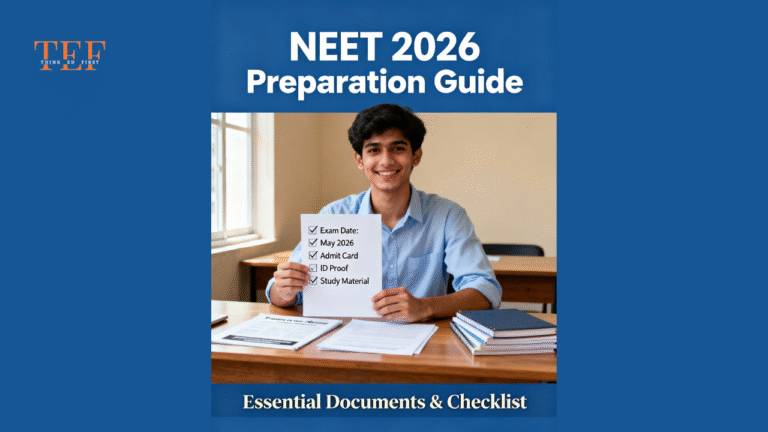Are you ready to tackle one of the most challenging exams in India? The NEET exam is a gateway to your dream of becoming a medical professional. But with 180 questions to answer in just 3 hours, how can you ensure you’re maximizing your score and managing your time effectively?
In this guide, we’ll walk you through a proven step-by-step approach to attempting the exam. Our methods are based on insights from top scorers and extensive research. We’ll cover everything from subject-specific tips to overall exam day tactics.
Time management and focus are crucial. We’ll also discuss the importance of mock tests, revision strategies, and how to fill out your answer sheet accurately. This guide is tailored for aspiring medical students in India, helping you approach the exam with confidence.
Ready to dive in? Let’s get started on your journey to success. For more detailed strategies, check out our NEET success strategies.
Understanding the NEET Exam and Its Pattern
Understanding the structure of the NEET exam is essential for effective preparation. The exam consists of 180 questions to be answered in 3 hours, covering Physics, Chemistry, and Biology. Each subject is divided into two sections, with a total of 720 marks at stake.
Time management is critical. For instance, students should aim to complete Biology in 45-50 minutes, leaving ample time for tougher questions in Physics and Chemistry. Mock tests are invaluable for practicing this pacing and identifying areas for improvement.
The NEET UG Paper Structure and Timing
The exam is divided into three sections: Physics, Chemistry, and Biology. Each section has two parts—Section A with 35 mandatory questions and Section B with 15 questions, of which 10 must be attempted. Here’s a breakdown:
| Subject | Section A | Section B | Total Marks |
|---|---|---|---|
| Physics | 35 questions | 10 out of 15 | 180 |
| Chemistry | 35 questions | 10 out of 15 | 180 |
| Biology | 35 questions | 10 out of 15 | 360 |
Key Challenges and Preparation Insights
One of the biggest challenges is managing time effectively. With only 1 minute per question, students must prioritize accuracy and speed. Reviewing previous year papers helps in understanding question patterns and anticipating tricky sections.
Mock tests are a must. They simulate the actual exam environment, helping students build stamina and confidence. Additionally, focusing on NCERT textbooks ensures a strong foundation, as 99% of the questions are derived from them.
Lastly, understanding the entrance format and competitive nature of the exam is crucial. Every student must approach the test with a clear strategy, balancing speed, accuracy, and confidence.
Our neet paper solving strategy for Exam Success
Mastering the NEET exam requires a well-structured plan and disciplined execution. A clear strategy not only boosts your confidence but also ensures you maximize your score. Let’s explore a proven method that has helped many toppers achieve their goals.
Overview of the Strategic Approach
Our approach focuses on three key elements: time management, targeted practice, and effective revision. By starting with your strongest subject, you can build momentum and tackle the paper methodically. This method reduces stress and enhances accuracy.
Mock tests play a crucial role in this strategy. They simulate the actual exam environment, helping you identify strengths and weaknesses. Regular practice with these tests ensures you’re well-prepared for the real challenge.
Step-by-Step Methods to Tackle the Paper
Begin by quickly scanning the paper and identifying easy questions. Answer these first to secure marks and build confidence. This is the first round of our three-round method.
In the second round, focus on moderate-level questions. Allocate time wisely, ensuring you don’t spend too long on any single question. If you’re unsure, mark it for review and move on.
The final round is for challenging questions. By this stage, you’ll have already secured a significant portion of your score. Use the remaining time to tackle these questions carefully, ensuring minimal errors.
Consistent practice and revision reinforce this strategy, making it second nature by exam day. This systematic approach not only improves accuracy but also reduces stress, helping you perform at your best.
Pre-Exam Preparation and Exam Day Tactical Tips
The final days before the exam are crucial for setting the stage for success. Proper planning and a calm mindset can significantly enhance your performance. Here’s how you can make the most of this time and ensure a smooth exam day experience.
Planning and Mock Test Practices
Mock tests are a cornerstone of effective preparation. They simulate the actual exam environment, helping you build stamina and confidence. Set up a schedule to take these tests during the same hours as the entrance test. This practice trains your mind and body to perform optimally during the exam.
Review your performance after each mock test. Identify areas where you struggle and focus on improving them. This targeted approach ensures you’re well-prepared for the real challenge.
Exam Day Routine and Stress Management
On the day of the exam, arrive early to avoid last-minute stress. A calm and stress-free routine sets the tone for a focused performance. Start your day with a light breakfast and avoid heavy meals that might make you feel sluggish.
Practice deep breathing exercises or positive self-talk to keep nerves at bay. These techniques help you stay composed and confident throughout the exam.
Effective OMR Sheet Filling Techniques
Filling the OMR sheet accurately is as important as answering the questions. Practice this during your mock tests to build speed and precision. Ensure you mark your answers clearly and avoid stray marks that could lead to errors.
Use the last few minutes before the exam to double-check your OMR sheet. This final review ensures you’ve marked all answers correctly and reduces the risk of mistakes.
By following these tactical guidelines, you can optimize your performance and approach the exam with confidence. A well-planned routine and focused preparation are your keys to success.
Subject-Wise Approach: Maximizing Biology, Chemistry, and Physics
A well-structured subject-wise approach can significantly boost your performance in the exam. By focusing on your strengths and allocating time wisely, you can maximize your score in Biology, Chemistry, and Physics. Let’s dive into strategies tailored for each subject.
Biology: Starting Strong with Confidence
Biology is often the easiest subject for many students, making it an ideal starting point. Its memory-based questions allow you to secure marks quickly. Begin by tackling diagrams and definitions, as they are straightforward and time-efficient.
Focus on high-weightage topics like Genetics and Human Physiology. Regular practice with previous year questions (PYQs) helps you identify recurring patterns and build confidence.
Chemistry and Physics: Balancing Speed and Accuracy
Chemistry and Physics require a balance of speed and precision. Start with Organic Chemistry, as it often has predictable question types. For Physics, prioritize Mechanics and Optics, which are heavily tested.
Use formulas and concepts effectively. Allocate 60 minutes to each subject, ensuring you don’t spend too much time on a single question. If stuck, move on and return later.
| Subject | Time Allocation | Key Focus Areas |
|---|---|---|
| Biology | 90 minutes | Genetics, Human Physiology, Diagrams |
| Chemistry | 60 minutes | Organic Chemistry, Periodic Table |
| Physics | 60 minutes | Mechanics, Optics, Formulas |
By tailoring your approach to each subject, you can optimize your performance and approach the exam with confidence. Practice regularly and use mock tests to refine your strategy.
Conclusion
Achieving success in the medical entrance requires a well-planned approach. By focusing on time management, consistent practice, and thorough revision, you can enhance your performance significantly. Accuracy in answering each question is crucial to maximizing your score.
Understanding eligibility requirements and reviewing year trends can also make a big difference. Use this guide as a framework to structure your preparation and stay confident throughout the process.
With dedication and the right strategies, you can improve both your answer accuracy and overall results. Stay resilient, and remember that every step you take brings you closer to your goal.





